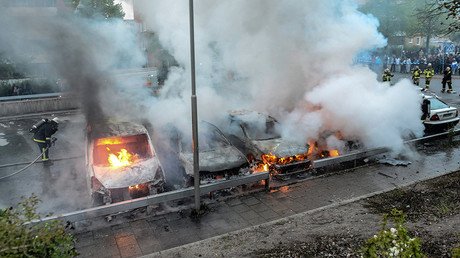‘Rape, robberies & murder: Swedish police lack resources to combat migrant crime wave’
When the great migrant wave came to Sweden, the police did not have the resources to handle not only traditional Swedish problems but also the problems that came with the new kinds of criminals, says Swedish Democrats party member Nima Gholam Ali Pour.
Swedish police say they “cannot cope” with the growing number of rape cases in the country. That is what one journalist was told who wanted to know why a man suspected of raping a 12-year-old girl two months ago has not yet been questioned.
“It is not right that the police think that they don’t have time to investigate rape crimes. They need to review their priorities,” the country's Minister of Justice and Home Affairs Morgan Johansson said.
A member of the nationalist Swedish Democrats party Nima Gholam Ali Pour says the police lack the resources to combat the scourge of crime now sweeping parts of the country.
“The problem is the Swedish police just do not have enough resources,” Ali Pour told RT.
“They do not have the right laws in place to do their job. And for a long time, they lacked political support to do their job.”
“Rape is a problem in Sweden. But if the police had the right resources that other police forces have in other countries, then they could do their job,” he continued.
According to Nima Gholam Ali Pour, “the migrant issue is part of the problem – when we had a great migration wave into Sweden, the police were not prepared for it.”
“When the migrants came, and we had social problems and crime with it, the police did not have the resources to handle the situation. They had resources for the Swedish population and the problems in Sweden but not the problems that camewith the wave of migrants," he added.
In Malmo, for example, the third largest city in Sweden, Ali Pour said there are “a lot of murders, shootings, and the prosecutors do not have the resources to follow up on this.”
As a result, many criminal cases are going “unsolved.”
In Ali Pour’s view, “the government is now spending more on the police, but the problems are more structural. We have areas in Sweden where the police have issues doing their job – the so-called ‘no go zones.'”
“These problems are structural; you can’t solve that problem only with resources. You need to change laws, you need to support the police, you need to train the police to handle a new kind of population that is not as peaceful as the Swedish population or as Sweden has traditionally been. We have new kinds of criminals in Sweden that are much rougher and the Swedish police are not trained enough, they don’t have the equipment or the resources to do their job adequately,” he said.
The statements, views and opinions expressed in this column are solely those of the author and do not necessarily represent those of RT.













